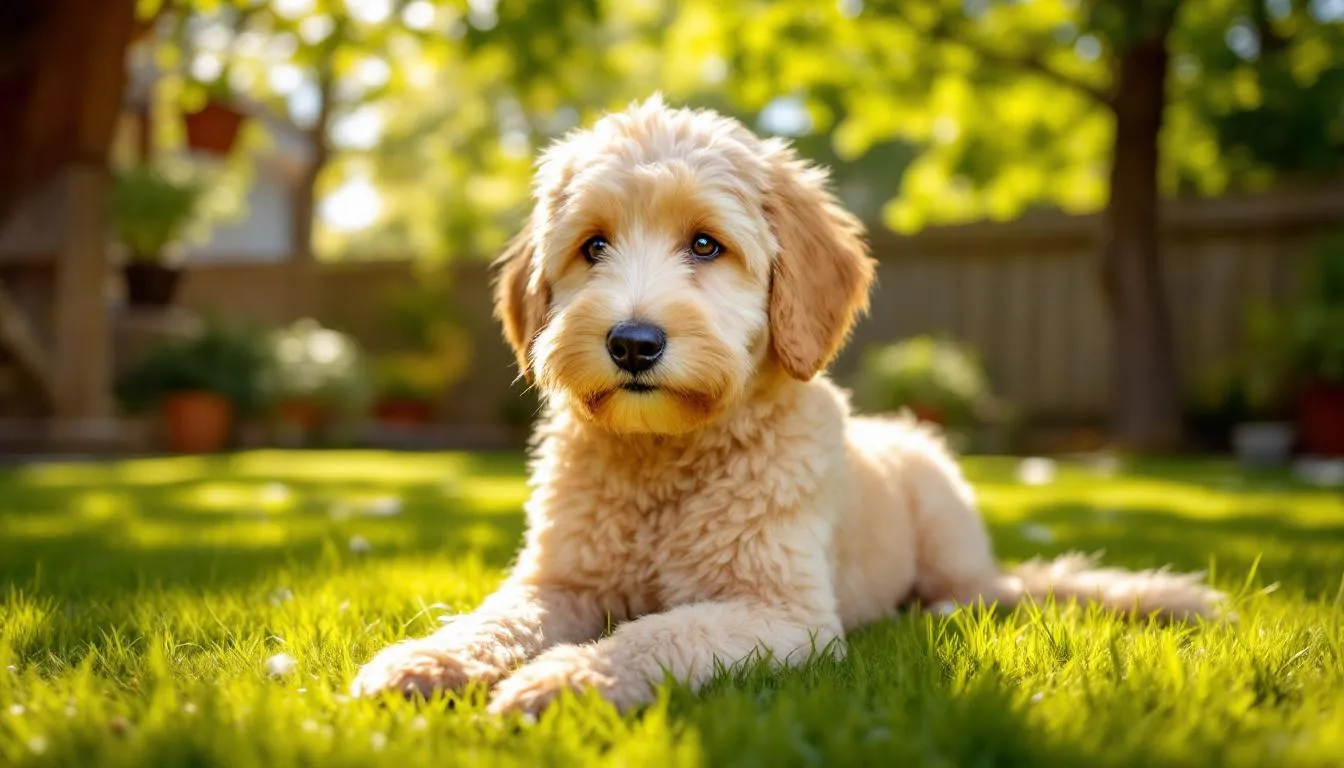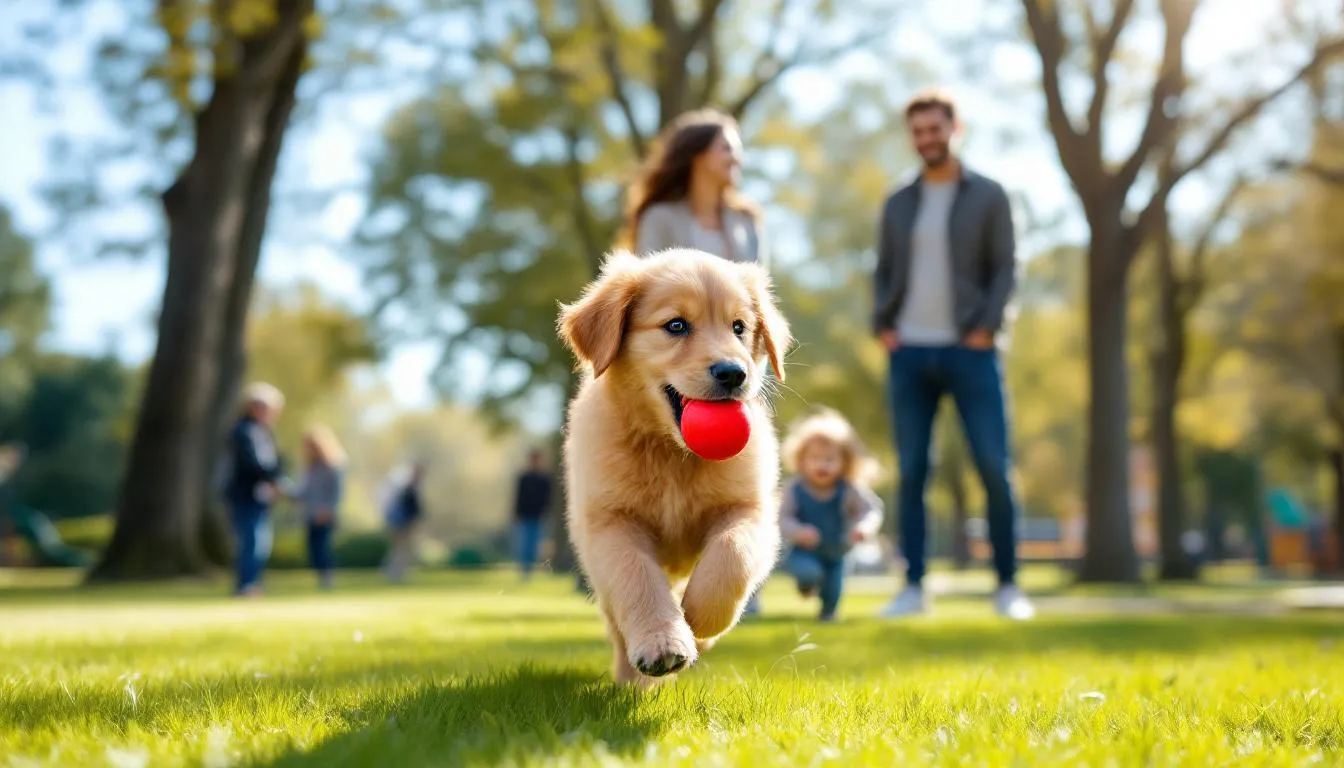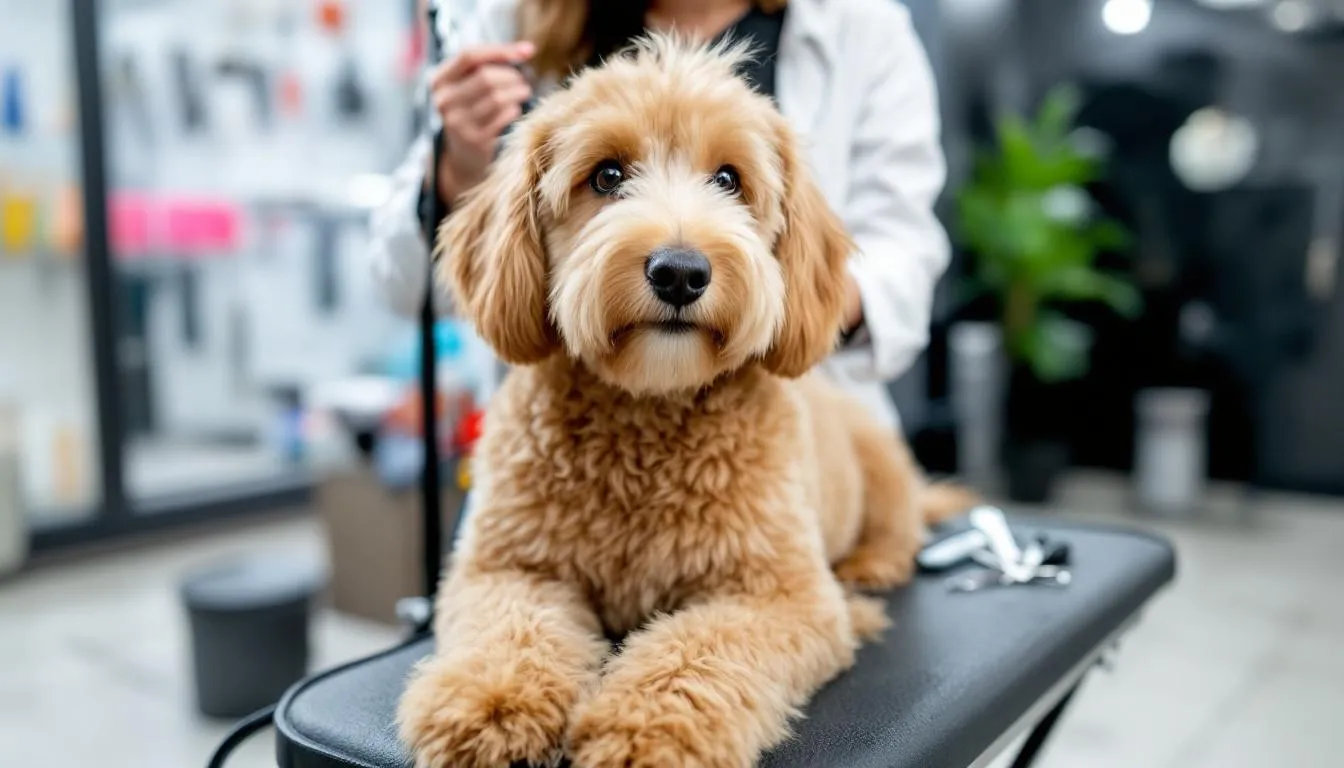Key Takeaways
- Mini goldendoodles are a cross between golden retrievers and miniature poodles, weighing 25-35 pounds when fully grown
- F1B mini goldendoodles (75% poodle genetics) offer superior hypoallergenic qualities with minimal shedding
- These highly intelligent dogs excel as family pets, therapy dogs, and service animals due to their gentle temperament
- Regular grooming every 6-8 weeks and daily brushing are essential for maintaining their coat healthy
- Prices typically range from $2,500-$4,500 from reputable breeders who conduct health testing
Mini goldendoodles are a cross between golden retrievers and miniature poodles, weighing 25-35 pounds when fully grown
F1B mini goldendoodles (75% poodle genetics) offer superior hypoallergenic qualities with minimal shedding
These highly intelligent dogs excel as family pets, therapy dogs, and service animals due to their gentle temperament
Regular grooming every 6-8 weeks and daily brushing are essential for maintaining their coat healthy
Prices typically range from $2,500-$4,500 from reputable breeders who conduct health testing


What is a Mini Goldendoodle Poodle Mix?
The mini goldendoodle poodle mix represents one of the most successful designer breeds of the past three decades. This intentional cross between a golden retriever and a miniature poodle combines the friendly and affectionate nature of the golden retriever with the intelligence and low shedding coat of the poodle. The mini goldendoodle is a hybrid resulting from crossing two purebred dog breeds, specifically the golden retriever and the miniature poodle.
Unlike purebred dogs recognized by major kennel clubs, mini goldendoodles are mixed breeds that gained popularity in the 1990s when breeders sought to create the perfect family companion. The goal was simple: develop a dog with the golden retriever’s gentle temperament and the poodle’s hypoallergenic qualities in a manageable size.
Also known as miniature goldendoodles or mini golden doodles, these dogs have earned their place as beloved family members across households worldwide. Their sociable nature and adaptability make them excellent pets for families with children, singles, and seniors alike. The mini goldendoodle breed is often discussed in terms of breed standards, generational labels such as F1 or F1B, and the importance of ethical breeding practices to ensure healthy, well-socialized dogs.
The breeding process involves careful selection of parent dogs to ensure the best traits are passed down. A purebred golden retriever is crossed with a mini poodle, resulting in first generation puppies, or pups, that inherit characteristics from both breeds.
Mini Goldendoodle Generations Explained
Understanding goldendoodle generations is crucial when selecting a mini goldendoodle puppy. Each generation offers different characteristics, particularly regarding coat type and shedding levels.
F1 Mini Goldendoodles represent the first generation cross between a purebred golden retriever and a miniature poodle. These dogs carry 50% genetics from each parent breed. F1 mini goldendoodles often display the most variation in appearance and coat type within a single litter.
F1B Mini Goldendoodles result from breeding an f1 mini goldendoodle back to a miniature poodle. This creates dogs with 75% poodle genetics and 25% golden retriever heritage. F1B generation dogs typically exhibit more consistent hypoallergenic coats and reduced shedding compared to F1s.
F2 Mini Goldendoodles come from breeding two F1 mini goldendoodles together. These second generation dogs maintain the 50/50 genetic split but often show more predictable traits than their F1 parents.
Multigen Mini Goldendoodles include F2B (F2 bred back to poodle) and subsequent generations. These dogs offer the most consistent characteristics, with multigen breeding programs focusing on producing reliable temperaments and coat qualities.
The impact of generation affects several key factors. Higher poodle genetics generally mean curlier coats, less shedding, and enhanced hypoallergenic qualities. However, it may also reduce some of the golden retriever’s characteristic friendliness, though most retain their affectionate nature.


Size and Weight Specifications
Mini goldendoodles weigh significantly less than their standard counterparts, making them ideal for various living situations. Standard mini goldendoodles typically reach 25-35 pounds when fully grown, with heights ranging from 14-17 inches at the withers.
Petite Mini Goldendoodles represent an even smaller variation, weighing 15-25 pounds at maturity. These dogs result from using smaller miniature poodles in the breeding program or incorporating toy poodle genetics.
Several factors influence adult size, including the size of parent dogs, specific generation, and individual breeding lines. Reputable mini goldendoodle breeders can provide weight predictions based on the parents’ sizes and previous litters.
Compared to standard goldendoodles that weigh 51+ pounds, mini varieties offer the same wonderful temperament in a more manageable package. This size makes them suitable for apartment living while still being sturdy enough for active families.
Growth typically continues until 12-18 months of age, with most reaching their adult weight by 14 months. Monitoring growth through regular vet visits ensures healthy development and helps identify any potential issues early.
Physical Appearance and Coat Types
The mini goldendoodle’s appearance varies based on which parent they favor and their specific genetic makeup. Most display the characteristic teddy bear look that makes them instantly recognizable and irresistibly cute.
Coat Textures range from straight to wavy to curly. Straight coats resemble the golden retriever parent more closely and may shed more than wavy or curly varieties. Wavy coats offer a nice balance of the golden retriever’s softness with improved shedding control. Curly coats, inherited from the poodle side, provide the best hypoallergenic qualities.
Coat Colors include cream, apricot, red, black, silver, chocolate, and various parti patterns. The cream and apricot shades are most common, inherited from golden retriever genetics. More unusual colors like silver or chocolate come from the poodle lineage.
The furnishings gene plays a crucial role in determining coat characteristics. Dogs with furnishings develop the fluffy facial hair and low shedding coat that many owners desire. Those without furnishings may shed more and have a smoother face similar to golden retrievers.
Seasonal coat changes occur as mini goldendoodle puppies mature. The soft puppy coat gradually transforms into the adult coat over the first 12-18 months, sometimes changing color or texture during this process. Mini goldendoodle pups require special care and socialization during their early development to ensure a healthy coat and to help them grow into confident, well-adapted adults.


Temperament and Personality Traits
Mini goldendoodles inherit the best personality traits from both parent breeds, creating dogs with charming personalities that adapt well to various family situations. Their friendly and affectionate nature makes them excellent companions for children and other pets.
The high intelligence inherited from poodles makes mini goldendoodles highly trainable. They excel at learning commands, house training, and complex tricks. This intelligence, combined with their eagerness to please, makes training sessions enjoyable for both dog and owner.
Their sociable nature means they thrive on interaction with family members and other dogs. Early socialization helps develop confidence and ensures they remain well-adjusted throughout their lives. Most mini goldendoodles naturally gravitate toward people and enjoy being part of family activities.
These dogs maintain moderate energy levels, making them suitable for various lifestyles. While they enjoy daily walks and playtime, they’re equally content relaxing at home with their family. Their retrieving instincts often shine through in games of fetch or when carrying items around the house.
The loyal nature of mini goldendoodles makes them excellent therapy dogs when properly trained. Their intuitive understanding of human emotions and gentle demeanor allow them to provide comfort in various therapeutic settings.
Hypoallergenic Qualities and Shedding
One of the primary reasons people choose mini goldendoodles is their reputation for being suitable for allergy sufferers. Mini goldendoodles are often marketed as hypoallergenic, meaning that "mini goldendoodles hypoallergenic" refers to their low-shedding, allergy-friendly qualities. While no dog is completely hypoallergenic, many mini goldendoodles shed minimally and produce fewer allergens than other breeds.
F1B and higher generation mini goldendoodles offer the most reliable hypoallergenic qualities due to their increased poodle genetics. The 75% poodle heritage in F1B dogs typically results in curlier, non shedding coats that trap loose hair rather than allowing it to fall throughout the home.
The furnishings gene significantly impacts shedding levels. Dogs with two copies of the furnishings gene (IC/IC) have the lowest shedding potential, while those with one copy (IC/F) may shed moderately. Dogs without furnishings (F/F) will likely shed more like golden retrievers.
Important considerations for people with severe allergies include spending time with the specific dog before committing, as individual reactions can vary. Some people with mild allergies find they can comfortably live with higher-shedding mini goldendoodles, while others require the most hypoallergenic varieties.
Regular grooming plays a crucial role in maintaining hypoallergenic qualities. Consistent brushing removes loose hair before it can spread throughout the home, and professional grooming keeps the coat in optimal condition for minimal allergen production.


Training and Intelligence
Mini goldendoodles rank among the most highly intelligent dog breeds due to their poodle heritage. This intelligence, combined with their desire to please their family members, makes them exceptionally easy to train. Their eager, trainable nature means that even first-time owners will find it straightforward to train a mini goldendoodle.
Positive reinforcement methods work best with these sensitive, smart dogs. They respond enthusiastically to treats, praise, and play-based rewards. Harsh corrections or punishment can damage their confidence and willingness to learn.
Early socialization forms the foundation of a well-adjusted mini goldendoodle. Exposing puppies to various people, environments, sounds, and experiences between 8-16 weeks helps prevent fearfulness and ensures they develop into confident adults.
House training typically progresses quickly with consistent routines. Most mini goldendoodle puppies can be reliably house trained within 4-6 months when given proper guidance and frequent opportunities to succeed.
Many mini goldendoodles excel in specialized training roles. Their intelligence and gentle nature make them excellent candidates for therapy dogs, emotional support animals, and even service dog work when bred and trained specifically for these purposes.
Crate training provides numerous benefits, including safe transportation, comfortable rest spaces, and house training assistance. Most mini goldendoodles adapt well to crates when introduced gradually with positive associations.
Exercise and Activity Requirements
Mini goldendoodles require regular exercise to maintain their physical health and mental well-being. Most adults thrive with 30-60 minutes of daily activity, which can be split into multiple sessions throughout the day.
Suitable activities include brisk walks, fetch games, swimming, and interactive play sessions. Their retrieving instincts make fetch particularly enjoyable, while their intelligence makes them excellent candidates for agility training and other dog sports.
Mental stimulation proves just as important as physical exercise. Puzzle toys, training sessions, and interactive games help prevent boredom and destructive behaviors. A tired mind often leads to a calm, content dog.
Apartment living works well for mini goldendoodles when their exercise needs are met consistently. Their moderate size and adaptable nature allow them to thrive in smaller spaces, provided they receive adequate outdoor time and stimulation.
Individual energy levels vary among dogs, even within the same litter. Some mini goldendoodles prefer gentle walks and mental puzzles, while others enjoy more vigorous activities like hiking or running with their owners.
Weather considerations include providing alternative indoor activities during extreme temperatures. Mental games, indoor fetch, and training sessions can help meet their needs when outdoor exercise isn’t possible.


Grooming and Maintenance
Professional grooming every 6-8 weeks keeps mini goldendoodles looking and feeling their best. The specific grooming schedule depends on coat type, lifestyle, and personal preferences for coat length and style.
Regular brushing is essential for maintaining coat health and preventing matting, especially for mini goldendoodles with curly or wavy coats. Using a slicker brush and metal comb daily removes loose hair and helps keep the coat tangle-free. Working in sections ensures thorough coverage, paying special attention to areas prone to tangles like behind the ears, under the collar, and around the legs.
Bathing frequency typically ranges from every 4-6 weeks or as needed. Using a gentle, tearless shampoo helps maintain coat health without causing irritation. Thorough drying after baths prevents skin issues and maintains the coat’s texture.
Regular nail trimming every 2-3 weeks prevents overgrowth and discomfort. Monthly ear cleaning with appropriate solutions helps prevent infections, particularly important for dogs with floppy ears that can trap moisture and debris.
Dental care includes regular teeth brushing with dog-safe toothpaste. Starting dental care early helps mini goldendoodles accept the routine and maintains oral health throughout their lives.
Grooming tools essential for home maintenance include a quality slicker brush, metal comb, nail clippers, ear cleaning solution, and dog-specific shampoo. Investing in good tools makes grooming more effective and enjoyable for both dog and owner.
Professional groomers familiar with goldendoodle coats can provide valuable advice on maintaining specific coat types and achieving desired looks while keeping the dog comfortable.
Health Considerations
Mini goldendoodles benefit from hybrid vigor, which can reduce the likelihood of certain inherited health issues common in purebred dogs. However, they can still inherit health problems from either parent breed, making health testing crucial.
Common health concerns include hip dysplasia, elbow dysplasia, progressive retinal atrophy, and heart conditions. Responsible breeders conduct comprehensive health testing on breeding dogs to minimize these risks in puppies.
Genetic conditions from the golden retriever side include hip and elbow dysplasia, certain eye conditions, and heart problems. Poodle-related health issues include hip dysplasia, progressive retinal atrophy, and Addison’s disease.
Regular veterinary checkups help catch potential health issues early when treatment is most effective. Annual wellness exams, vaccinations, and parasite prevention form the foundation of preventive healthcare.
Life expectancy for mini goldendoodles typically ranges from 12-15 years, though some live longer with excellent care. Mini goldendoodles live healthy, active lives when provided with proper nutrition, regular exercise, and consistent veterinary care, all of which contribute to their longevity and quality of life. Factors affecting lifespan include genetics, diet, exercise, healthcare, and overall lifestyle.
Preventive care includes maintaining appropriate weight, providing regular exercise, ensuring proper dental care, and staying current with vaccinations and parasite prevention protocols recommended by your veterinarian.
Finding a Reputable Breeder
Selecting the right breeder significantly impacts your mini goldendoodle’s health, temperament, and overall quality of life. Reputable mini goldendoodle breeders prioritize health testing, proper socialization, and ethical breeding practices.
Health testing requirements for quality breeding programs include hip and elbow evaluations, eye clearances, heart clearances, and genetic testing for hereditary conditions. Both parent dogs should have current health clearances before breeding.
Goldendoodle Association of North America (GANA) accreditation provides assurance that breeders follow established standards for health testing, ethical practices, and puppy care. GANA breeders commit to comprehensive health testing and responsible breeding practices.
Questions to ask potential breeders include requests to see health testing results, meet the parent dogs, visit the breeding facility, and learn about socialization practices. Reputable breeders welcome questions and provide detailed information about their breeding program.
Red flags to avoid include breeders who always have available puppies, don’t allow facility visits, can’t provide health testing documentation, or seem focused primarily on profit rather than producing healthy, well-socialized dogs.
Expected investment from reputable sources typically ranges from $2,500-$4,500, though prices vary by location, breeder reputation, and specific bloodlines. This investment includes health testing, proper veterinary care, and early socialization.
Bringing Home a Mini Goldendoodle Puppy
Bringing home a mini goldendoodle puppy is an exciting milestone for any family. To ensure a smooth transition, it’s important to prepare your home in advance. Start by puppy-proofing your living space—remove or secure anything that could be hazardous, such as electrical cords, small objects, and toxic plants or cleaning supplies. Block off rooms or areas that are off-limits to keep your curious goldendoodle puppy safe as they explore.
Set up a cozy, designated area for your mini goldendoodle to sleep, eat, and play. A comfortable crate or puppy pen can provide a sense of security and help with house training. Stock up on essentials like food and water bowls, a soft bed, age-appropriate toys, and safe chew items to keep your puppy entertained and engaged.
Mini goldendoodle puppies are highly intelligent and thrive on regular exercise, training, and socialization from the very beginning. Short, positive training sessions using treats and praise will help your puppy learn basic commands and good manners. Early socialization—introducing your puppy to new people, gentle dogs, and a variety of sights and sounds—will set the foundation for a confident, well-adjusted adult dog.
With patience, consistency, and lots of love, your mini goldendoodle will quickly settle into their new home and become a cherished member of the family. Remember, the first few weeks are crucial for building trust and establishing routines that will last a lifetime.
Goldendoodle Puppy Care
Caring for a goldendoodle puppy involves more than just cuddles and playtime—it’s about setting healthy habits that will last a lifetime. Mini goldendoodles need a balanced diet tailored to their age and size. Choose high-quality puppy food and monitor portions to prevent overeating, as these dogs can be prone to obesity if not managed carefully.
Regular exercise is key for mini goldendoodle puppies. Short walks, gentle play sessions, and interactive toys help burn off energy and support healthy growth. As your puppy matures, gradually increase activity levels to match their stamina and curiosity.
Grooming is especially important for mini goldendoodles, as their curly coat can easily become tangled or matted. Begin daily brushing early to prevent matting and to get your puppy used to the grooming routine. Use a slicker brush to remove loose hair and keep the coat healthy and shiny. Regular grooming appointments for trims will help maintain their signature look and prevent discomfort.
Routine veterinary visits are essential for monitoring your puppy’s development and catching any health issues early. Keep up with vaccinations, deworming, and flea and tick prevention as recommended by your vet.
By providing consistent care, regular exercise, and proper grooming, you’ll help your mini goldendoodle puppy grow into a happy, healthy, and well-mannered adult dog.
Family Life and Suitability
Mini goldendoodles are the perfect addition to many families thanks to their friendly and affectionate nature. Their charming personality and highly intelligent, highly trainable temperament make them a joy to have around children and adults alike. These dogs thrive on companionship and love being involved in all aspects of family life, from playtime in the backyard to relaxing evenings on the couch.
Their low shedding coat is a major advantage for families with mild allergies, as mini goldendoodles produce less dander than many other breeds. While no dog is completely hypoallergenic, their low shedding and minimal odor make them a popular choice for allergy sufferers.
Mini goldendoodles are also known for getting along well with other pets, including dogs and cats, especially when socialized from a young age. Their sociable and adaptable nature means they can fit into a variety of living situations, whether you have a bustling household or a quieter home.
Regular exercise and mental stimulation are important to keep your mini goldendoodle happy and healthy. Families with busy schedules should plan for daily walks, play sessions, and interactive games to meet their dog’s needs.
Overall, mini goldendoodles make excellent family pets, offering a wonderful blend of affection, intelligence, and adaptability that suits many lifestyles.
Service and Therapy Work
Mini goldendoodles are increasingly recognized for their outstanding abilities as therapy dogs and service animals. Their affectionate nature, intelligence, and eagerness to please make them ideal candidates for providing comfort and support in a variety of settings.
As therapy dogs, mini goldendoodles visit hospitals, nursing homes, and schools, where their gentle demeanor and friendly presence help lift spirits and provide emotional relief. Their small size allows them to easily navigate tight spaces and interact comfortably with people of all ages.
In service roles, mini goldendoodles are trained to assist individuals with disabilities by performing specific tasks such as retrieving items, opening doors, or providing stability. Their intelligence and trainability mean they can quickly learn complex commands and adapt to their handler’s unique needs.
With the right training and socialization, mini goldendoodles can make a profound difference in the lives of those they serve, offering not just practical assistance but also companionship and emotional support. Their versatility and loving disposition continue to make them a top choice for therapy and service work.
Living with a Mini Goldendoodle
Daily life with a mini goldendoodle revolves around routine, interaction, and meeting their physical and emotional needs. These dogs thrive on consistency and being included in family activities.
Ideal family situations include households that can provide regular exercise, consistent training, and plenty of interaction. Mini goldendoodles adapt well to families with children, seniors, and everything in between when their needs are met.
Compatibility with children is generally excellent due to their gentle nature and appropriate size. Teaching children how to interact respectfully with dogs and supervising interactions ensures positive relationships for everyone.
Space requirements are flexible, though these dogs appreciate having access to outdoor areas for exercise and exploration. Apartment living works well when combined with regular outings and activities.
Daily routine recommendations include morning exercise, training sessions, meal times, play periods, and evening walks. Consistent schedules help mini goldendoodles feel secure and well-adjusted.
Long-term commitment considerations include 12-15 years of daily care, regular grooming expenses, veterinary costs, and adapting to changing needs as the dog ages. The commitment extends beyond the cute puppy phase to encompass their entire lifetime.
Other pets in the household typically get along well with mini goldendoodles when proper introductions are made. Their sociable nature and moderate size make them good companions for cats and other dogs.
The forever home concept emphasizes the importance of commitment to providing excellent care throughout the dog’s entire life, including adapting to age-related changes and potential health issues.
FAQ
Are Mini Goldendoodles good for first-time dog owners?
Yes, their intelligence and eagerness to please make them excellent for beginners, though consistent training and socialization are essential. New owners should be prepared for regular grooming needs and the importance of early training to prevent matting and establish good behaviors.
How much do Mini Goldendoodles bark?
They typically have moderate barking tendencies and can be trained to minimize excessive vocalization through proper training and mental stimulation. Most bark to alert their families but aren’t considered excessive barkers when their needs are met.
Do Mini Goldendoodles need special food or diet?
They thrive on high-quality dog food appropriate for their age and activity level, with no special dietary requirements beyond standard nutritional needs. Maintaining proper weight is important for joint health and overall well-being.
Can Mini Goldendoodles be left alone during work hours?
While they prefer companionship, properly trained mini goldendoodles can handle 6-8 hours alone with adequate exercise before and after. Providing mental stimulation through puzzle toys and ensuring they’re well-exercised helps them cope with alone time.
What’s the difference between Mini and Micro Goldendoodles?
Micro goldendoodles are even smaller (under 15 pounds) and are bred using toy poodles, while minis use miniature poodles as the poodle parent. Micro varieties may have different health considerations due to their extremely small size and aren’t produced by all breeders.
FAQ
Are Mini Goldendoodles good for first-time dog owners?
Yes, their intelligence and eagerness to please make them excellent for beginners, though consistent training and socialization are essential. New owners should be prepared for regular grooming needs and the importance of early training to prevent matting and establish good behaviors.
How much do Mini Goldendoodles bark?
They typically have moderate barking tendencies and can be trained to minimize excessive vocalization through proper training and mental stimulation. Most bark to alert their families but aren’t considered excessive barkers when their needs are met.
Do Mini Goldendoodles need special food or diet?
They thrive on high-quality dog food appropriate for their age and activity level, with no special dietary requirements beyond standard nutritional needs. Maintaining proper weight is important for joint health and overall well-being.
Can Mini Goldendoodles be left alone during work hours?
While they prefer companionship, properly trained mini goldendoodles can handle 6-8 hours alone with adequate exercise before and after. Providing mental stimulation through puzzle toys and ensuring they’re well-exercised helps them cope with alone time.
What’s the difference between Mini and Micro Goldendoodles?
Micro goldendoodles are even smaller (under 15 pounds) and are bred using toy poodles, while minis use miniature poodles as the poodle parent. Micro varieties may have different health considerations due to their extremely small size and aren’t produced by all breeders.
Conclusion
In conclusion, mini goldendoodles stand out as one of the most popular and versatile breeds, thanks to their friendly and affectionate nature, intelligence, and low shedding coat. They are well-suited for family life, making wonderful pets for people with mild allergies and those seeking a loyal, loving companion. Their adaptability and gentle temperament also make them excellent candidates for service and therapy work, enriching the lives of those they assist.
With proper care, regular grooming, and plenty of love, mini goldendoodles can thrive and become cherished members of any household. Whether you’re looking for a playful family pet or a dedicated service dog, the mini goldendoodle’s unique combination of traits ensures they’ll bring joy, comfort, and companionship to your life for years to come.






